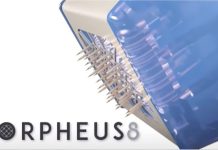
Restylane has become one of the most recognizable names in injectable fillers, and its parent company, Galderma, has launched several hyaluronic acid (HA) subtypes over the last few years to serve a variety of aesthetic purposes. Restylane Kysse, for example, is indicated specifically for natural-looking lip volume, and Restylane Defyne has been used primarily to lessen the look of laugh lines around the mouth. And now, Defyne is broadening its repertoire, having just been approved by the U.S. Food and Drug Administration (FDA) for augmentation and correction of mild to moderate chin retrusion for adults over the age of 21.
This new indication expands the approved lower-face indications for Restylane Defyne, which has, up to this point, been approved for filling in and smoothing out nasolabial folds and marionette lines. “The chin is the foundational anchor of the face that brings the rest of your features into balance,” Alisa Lask, general manager and vice president of the U.S. Aesthetics Business at Galderma, said in a statement. “Consumers can now address the chin with a non-surgical, safe option from a brand that uses cutting-edge XpresHAn Technology to shape and produce long-lasting results.”
Board-certified dermatologist Anne Chapas, who served as an investigator in clinical trials of Restylane Defyne for the chin, says this proprietary technology is a key differentiating point between Defyne and other fillers that may be used for the chin area. “[XpresHAn Technology] creates a smooth, injectable gel that integrates into the skin for natural, dynamic movement,” Chapas tells Allure. “Unlike other chin enhancements on the market, Restylane Defyne is the first and only chin filler to demonstrate results across patients with all skin types, males, and patients over the age of 52.”

The key word there is “enhancement” — using dermal filler in the chin area is more nuanced than simply making the chin look larger, board-certified plastic surgeon Adam Kolker says. “While the chin projection and definition does increase, the goal is not necessarily bigger but rather more beautiful, balanced, and proportional,” he tells Allure. “With an eye toward achieving subtle enhancement rather than transformation, an injectable HA filler like Restylane Defyne enables an extremely safe, non-surgical, minimal-downtime method to improve facial balance and harmony.”
According to board-certified plastic surgeon David Shafer, for those who may describe their chins as “weak,” chin augmentation with Restylane Defyne may be a desirable and effective option. “Any patient with hypoplastic or recessed chin is a good candidate,” he tells Allure, explaining that dermal fillers approved for chin augmentation have been a game-changer for lower-face aesthetics. “Traditionally, the only options were radical surgery with cutting and advancing the chin for more projection or surgically placed implants. While an implant is a relatively minor surgery and has permanent effects, many patients like the idea of fillers as they are temporary and reversible.”
So does injectable chin augmentation replace surgical solutions? It depends on who you ask. “Restylane Defyne is a great alternative for those who would prefer nonsurgical treatment options for chin enhancement and augmentation versus undergoing surgery with a chin implant,” Chapas tells Allure. “There may be cases that implants are warranted, but in my experience, I’ve found I’m able to achieve great results with the use of Restylane Defyne, with little to no downtime incurred by my patients.”
Board-certified plastic surgeon Andrew Jacono, on the other hand, sees it more as a temporary way to preview what a permanent implant could do for a patient. “While injectables cannot replace surgical procedures for a variety of reasons, including that the majority of them are hyaluronic acid fillers which degrade over time, Restylane Defyne can be used to provide patients with a glimpse into what a cheek, chin augmentation, or rhinoplasty may look like,” he tells Allure.
Deanne Mraz Robinson, a board-certified dermatologist, brings up another factor in choosing between a treatment like Restylane Defyne and an implant: “Something to consider is filler requires maintenance and re-injection and may ultimately cost more than a one-time chin augmentation surgery,” she notes. According to Chapas, the average price for one chin augmentation session with Restylane Defyne is $975.
Restylane Defyne’s FDA approval for chin augmentation comes nearly eight months after another hyaluronic-acid filler, Juvéderm Voluma XC, received approval for similar lower-face usage. The main difference, according to the doctors Allure spoke to, is how long they respectively last. “While both Restylane Defyne and Juvéderm Voluma XC are quite viscous and can be used for sculpting areas like the chin, Juvéderm Voluma XC lasts almost twice as long at Restylane Defyne — up to two years,” Jacono explains. Each of the experts consulted say Restylane Defyne lasts approximately one year.
That’s not to say Defyne is somehow inferior because it doesn’t last as long. “Defyne is an outstanding and comparable alternative, and a welcome addition to our armamentarium for augmentation and enhancement of the chin,” Kolker says. According to Galderma’s Restylane website, the most common side effects are swelling, redness, pain, bruising, headache, tenderness, lump formation, and itching at the injection site, which are comparable to Juvéderm Voluma XC’s.
Ultimately, which filler to use is a decision to be made between you and your board-certified dermatologist or plastic surgeon.







